A human being has a shelf life. It’s a strange thought, given how essential we tend to think we are, as though we’ll be around forever. But we won’t. We’re born, we ripen, we die. And how do we die? I was on my knees, boxer shorts around an ankle, not only praying but vomiting, and not only vomiting but battling ferocious incontinence, when I realized, We all die like dogs.
The monastery was empty, which suited me. I like to suffer alone. The other monks were on retreat in L.A., but I’d stayed behind to watch camp. An hour earlier I’d awoken with a sting in the left side of my abdomen, as though I’d swallowed a fishhook and someone was tugging the line. It felt like a communication from the land of the dead. After two more hours of vomiting, then spinning around, sitting, and shitting, vomiting and shitting, vomiting and shitting, my hands started tingling and my eyes felt fuzzy, almost carbonated: I saw stars.
The only thing that could hurt this much, in just this way, is giving birth, I thought. Or dying.
I fell to the carpet before the toilet and just began to wail. I rested my head on my clenched fists and screamed, “Please God please God please God.” But you cannot pray your way around what God has placed squarely in your path. So I called 911. I was huddled in a death clump in the room where my teacher gives private interviews when the paramedics stormed the cabin.
“I think I have food poisoning,” I said.
The tall, sinewy one from the Fire Department produced a silver tube of activated charcoal. He had a sweet expression and trustworthy eyes.
“Will that make me throw up?” I asked.
“Nope.”
“Are you just saying that?”
“No sir, we don’t do that.”
I sucked down some of the thick paste and instantly scream-puked all over the wall and carpet and a row of my teacher’s robes, which were hanging on a hook in plastic dry-cleaning bags.
“We’re going to take you to the hospital,” he said.
Moments later I was staring at the ambulance ceiling. A big, strong woman put a blanket over me, tastefully covering my dick, which was hanging out of my boxers, sloping to one side like an exhausted gerbil. She kept asking, “You okay?” When I was not, she would hold open a plastic bag, I would tilt my head, and more horrible wonders would fall out of my mouth. In this way, we inched down the mountain switchbacks. I was being escorted not only to the hospital, but to a whole new frame of mind. I was about to become a “patient,” which is a telling term.
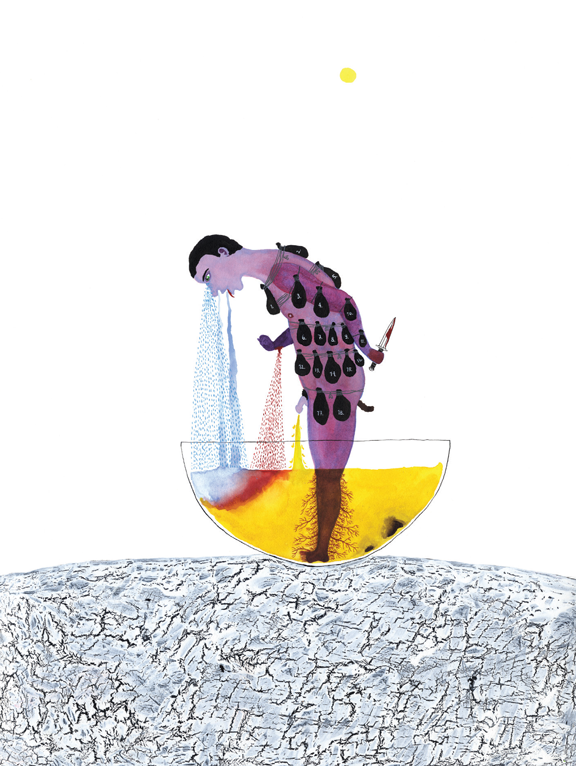
Patience is key to your mental health when you are physically ill. It is one of the few virtues you can actively cultivate when your body ceases to cooperate. When sick, you must practice the lost art of waiting and seeing, for your life is now on hold. You must slow down to meet the rhythms of a body that is fighting with itself, for you. The problem is, once you do slow down, the demons—the anxieties and fears you were fleeing while you were healthy—finally catch up with you. Now, when you are at your lowest, they swarm over you and feast on you, like those African ants that devour a wildebeest from hoof to horn—a black stream rushing over heaving flesh, washing away the meat, organs, entrails, leaving nothing but gleaming white bone.
Sickness ravishes you spiritually and strips you to the bone.
All the surfaces in the ER were lined with hard tile so that blood and guts could be easily hosed down the floor drains. Nurses wheeled my gurney behind a plastic curtain. I wasn’t sure who I belonged to. Several medical professionals poked me and took my information, but everyone seemed to have someplace else to be. They kept asking for my social security number, which served to remind me that I was incurring expenses that would be somewhere in between the price of a nice used car and a commercial flight to outer space. I began making up numbers.
“Six six six, six six nine, six nine six nine.”
“That’s an odd number!”
“BLAAAAA”—and again I vomited into a plastic bag.
“Nurse, nurse, please help me! Please please, Ah yiy yiy!” a Mexican woman screamed from the other side of my curtain.
A doctor parted the curtain, clutching my blood test. What I learned was this: “Your lipase and amylase levels are through the roof.”
Welcome to amylase and lipase.
“What’s that mean?” I asked.
She gave a detailed and thorough answer that told me nothing.
The Mexican woman continued to wail: “Oh please give me something! Ay yiy yiy! Oh please God God God!” “Whus rung with her?” I asked. My lips felt like rubber. A nurse’s aide turned to me: “Absolutely nothing! She’s doing great!”
All 43 muscles in his face slid into place as he smiled. I was smiling too. Something new was trickling through the IV in my arm: Dilaudid, an esteemed member of the morphine family. Everything became like an opium dream. Slow and creamy. Even the stock-still silver instruments were dancing a little. There was still pain, yes, but not my pain—it was as though a horrible battle was coming to a head several miles beneath me. Not my problem. Good luck with that, guys.
I want to say that when they wheeled the screaming Mexican woman past my curtain our eyes met, and something was exchanged, but what I really remember is the period of relative calm that followed her departure . . . . Then a new nurse was sitting on the gurney beside me. Her lips were blood red and collagen-puffed into a kind of permanent “Why me?” grimace. Her makeup looked like a second face, both masking and magnifying the one underneath. Such a strange sight, this giver of care! Somewhere in between a shaman and a stripper.
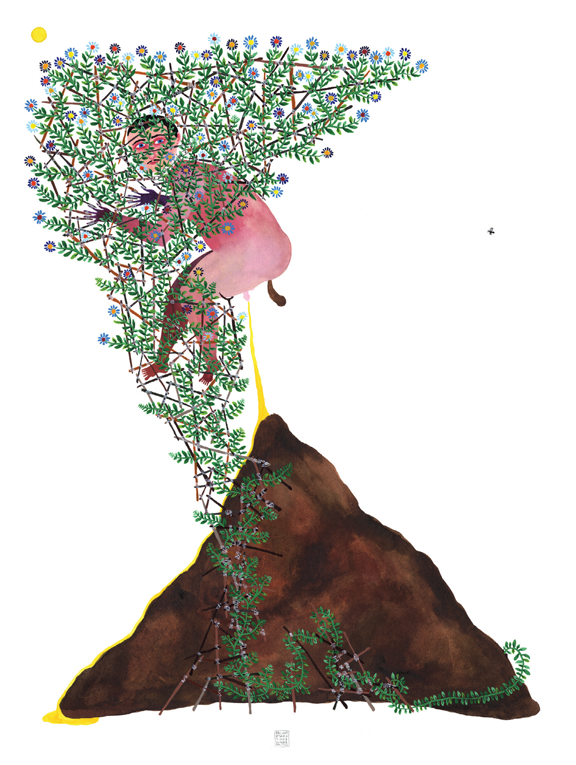
“With enzyme levels like this, it’s probably pancreatic cancer,” she began. “I think you probably have this cancer… yeah. It’s not uncommon. Pavarotti just died from it. You know, the opera singer? It’s usually irreversible,” she said. “It’s inoperable,” she added, in case I had missed that.
“You die from it?”
“You die from it. Generally. Yeah. But we’ll let you know for sure,” she said, and then she nodded solemnly and left the room.
I want to slow the story down here, because this is where time really slowed for me, slowed until it stopped cold at the very beginning of what appeared to be the very end of my life. I could almost feel the Great Wheels of Existence grinding to a halt all around me. I entered a time that was entirely within myself, stared through the rustling curtain into the busyness beyond, and took the situation in.
Speeding gurneys, blinking lights, worried brows. I could hear and feel my breath, but nothing else. It was about 10 a.m. For the first time that day I was not afraid, and for this I thank the combination of my first real taste of death with my first real opium high. The pain made me lucid, the drug made me dreamy: and so I had a kind of lucid dream, a vision of sorts.
Everyone carries their death within them, I thought. And this is the death that I’ve been carrying within me. Cancer.
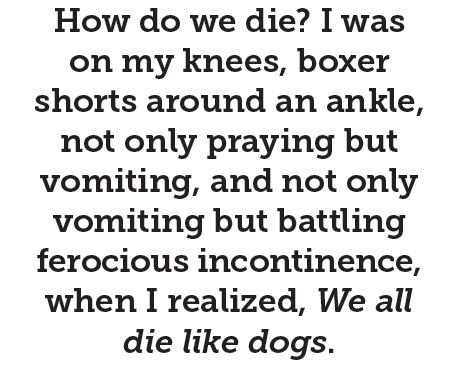
My whole life I had been looking forward to something. And now it hit me like the wakeup slap the doctor delivers to a newborn’s behind—it was almost comical: What the hell have I been looking forward to? Except the end. That’s what comes next. The future is the finish line. That’s what’s finally waiting for us around the next corner.
But here’s the interesting thing: I felt absolutely no regret. I didn’t feel that I had missed a single thing in my life or done a single thing that I should not have done. I realized that my life itself was the only standard by which my life could be judged, and therefore it had been, in its own way, perfect. A conclusion is what gives the preceding events coherence and meaning, and now that I knew how it would end, there was nothing about my life that I would have changed. It was like a wife I had been on uneasy terms with for 34 years, but in this moment I came to realize that I was in love with every little thing about her, and I had been all along.
A shadow came over me. I looked up. A kind but grim-faced doctor was standing there, blocking the overhead light.
He said, “You have pancreatitis.”
“I know.” I figured this was the name of my little cancer baby. “How long do I have left?”
He laughed without smiling. “You’ve already survived the worst of it. Assuming the attack was acute and not chronic, you’ve got a long life ahead of you.”
“What?”
“You’re going to live.”
And just like that, time started up again, and with it the usual sounds, smells, fears. Who was that fake angel of death, that pretty, painted clown who had delivered my fraudulent death sentence? I never saw her again. They gave me new nurses, new nonslip socks, and a new room in intensive care. For the next week I fasted, received fluids through a drip, and got zonked on Dilaudid, but mostly I tried to figure out what the hell was wrong with me—which, in one way or another, was how I’d spent most of my life.
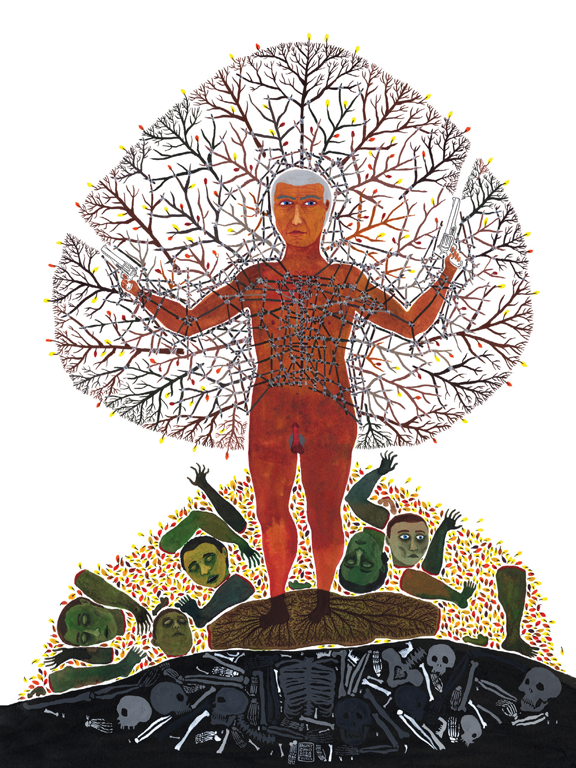
I only very peripherally remembered the pancreas from college biology. It is a six-inch slab of glandular meat located in the lower abdomen, and rediscovering it was like meeting a long-lost son—who’d come to kill me. The doctor told me I was lucky: pancreatitis attacks this severe often result in death. During an attack, amylase and lipase, the enzymes that the pancreas normally secretes to aid in digestion, rebel against their source; they try to sizzle the organ down through their chemical fire into an annihilated pile of self-digested slop. Primary causes: advanced alcoholism or gallstones. The CT scan convinced my doctors that I didn’t have gallstones, and I convinced them that I wasn’t an alcoholic.
So what had caused my pancreas to suddenly turn on itself?
I went on zanka—a leave of absence from the monastery—and flew to my parents’ home in Wisconsin, where I promptly became both the star of and audience for a black comedy about the human body. My brother-in-law, a brilliant chiropractor and former triathlete, turned me on to a probiotic that boasted “Vaginally-derived beneficial bacteria from a healthy 23-year-old woman.” “The science is solid,” he insisted. “I’m going to email you a link. Order these vaginamins stat!”
I was on probiotics because I was on antibiotics: antibiotics to kill the bad bacteria, probiotics to foster good bacteria—which, my mother’s nutritionist avowed, is essential for proper digestion. Of course he was the one who had told me to get on the antibiotic in the first place. Per his orders I positioned a tiny plastic jar beneath my ass and strategically pinched a turd, which I then mailed to a company in Utah for analysis. They claimed I had parasites, a possible cause of pancreatitis—hence the antibiotics, the brutally strong Flagyl, on which I overdosed at one point, causing urine the color of stout beer and a brief hallucination involving a toadstool growing from my father’s person.
Meanwhile, my mother had a hunch that the meat-free diet at the monastery had caused my pancreatitis. She served me pig and cow for every meal. Who was I to argue? I was eating vaginal bacteria derived from, I sometimes imagined, a healthy, attractive, and broke 23-year-old Comparative Religions grad student named Trinity or Star—so why not go in for a little meat therapy while I was at it?
All signs indicated that my pancreatitis had been acute, a one-shot deal, and that I was now in recovery mode. But whatever caused the illness was still inside me. I could feel it. Or at least I thought I could. When you don’t know why you got sick, just about anything can be the cure, and you never really know if you’re finally getting better. You go round and round in circles, taking medicine that produces side effects which you imagine to be a new manifestation of the enigmatic illness, so you take another type of medicine, which produces more and different side effects, and what began as a simple pain in your side becomes a spiraling descent into the blackness at the core of your being. Exhaustion becomes depression, and depression becomes despair.
How much longer could I go on living like this? And was this really living? Again and again I asked myself “What is wrong with you? Where did this sickness come from?” and again and again I came up short. I was terrified that the instant I stopped worrying about my illness it would return. I wanted to be sure that it was gone forever. But I would never be sure. The bad thing could happen to me again at any time and there was nothing I could do about it. The next time around it might even kill me. The fact that I could not accept this was preventing me from getting on with my life.
One night I awoke with a shooting pain in my side. Or was it a shooting pain in my mind? I couldn’t tell the difference anymore. I rolled out of bed, went downstairs and into the garage, opened the garage door, sat down on a folding chair, and collapsed into a full-blown spiritual crisis as rain pounded through the darkness before me.
I threw down with my demons until dawn. It was as though my thoughts and emotions were attacking me just as the enzymes of my inflamed pancreas had attacked their source on a similar night three months ago. What was I doing in that garage? I was doing everything. I was arguing with myself, arguing with others in my head, praying, cursing, aching. What I remember most was wanting to sob, and just opening my mouth and—nothing coming out. That terrified me.
Then the dark night of the soul became whatever it becomes when the sun starts to rise, and I realized that I was too exhausted for any more of this shit. I had no more fight left in me. You cannot defeat your demons, for they thrive on the fight itself.
The lights went on inside the house. My mother the early bird was up preparing my all-beef breakfast. I really didn’t want her to see me like this. She’s one of my favorite people. I wasn’t an easy birth, I wasn’t an easy kid, and I didn’t want to be a difficult adult on top of all that.
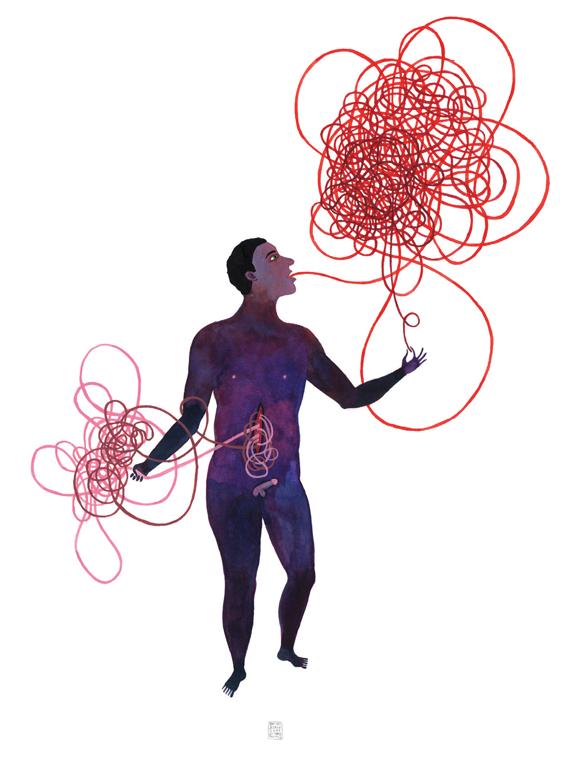
You have got to get it together, I thought. If not for yourself, then for your mother. So I got it together the only way I know how. I took a deep breath. Then I took another. I let the inhale and exhale do their thing. The mind has a mind of its own. It takes work to be simple and true, and when it’s working, it’s really no work at all.
Where do you go when your life is broken and the way back to yourself is lost? You go to your knees—or your butt, if you’re a Zen monk. The moment I got sick a light went out, and since then I’d forgotten the most basic principle of Zen meditation: breathe into the place where you ache the most. For three months I’d obsessed over the pain in my gut, but not once had I inhabited this region through conscious breathing. I’d fallen deeper and deeper inside myself looking for the cause of my sickness, but the farther I went the more distance there was to go. I couldn’t stop thinking—that was the real disease.
Breathing in the summer rain felt like throwing open the doors and windows on a house that had been boarded up for a century. Where was this breath coming from? Where did it go? It came and left me freely. Nature wanted to merge with itself, and I was the chosen means for this connection. All I had to do was breathe. So I did. I inhaled, and all of nature flowed through me. I exhaled, and all of nature flowed from me.
I was rooted to that chair for quite some time before an insight came upon me the way a deer appears in a silent forest: its presence, though heralded by a light pounding of the earth, somehow making the forest quieter still.
I am not really afraid of death.
Actually, I was a little bit pissed off at death. I’d faced it in the hospital, accepted it, and then it stood me up. Now I had to face an equally terrifying and profound prospect.
I have to go on living.
With that thought my mind stopped, and I heard the rain falling in the morning light through the open garage door before me. The true statement is the one that stops your mind and brings you back out of yourself into the world around you.
I felt something in my side again. It was not so much a sensation as a twitch of recognition, like the first kick of life in a mother’s womb, the pulse that is equally self and other. It was the sound of the rain as the gut hears it, when the gut is listening. Water went from the sky into my belly, and then it was rolling down my cheeks and I could barely breathe because of my joy.
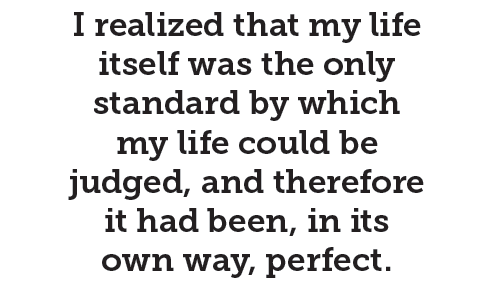
The experience—it was a moment of grace—took me back to the emergency room three months earlier, to the wails of the Mexican woman.
“Ay yiy yiy—give me something!”
When they wheeled her gurney past the open curtain I got a good look. Her hair, dyed red, was plastered against her engorged face. She threw back her head and opened her mouth and screamed. She looked like she wanted to kill every living thing in the building, especially her husband, who was clearly out of his element.
Her legs were spread and her knees were pointed at the ceiling. Her belly was a galactic ball of fire. She was passing through the ER on her way to the maternity ward.
I want to say that our eyes met and that she saw that I was dying just as I saw that she was giving life; that the pain in her belly and the pain in mine were, like the inhale and the exhale, intimate partners in a single activity that was manifesting and dissolving the entire universe. I want to say that we both recognized that the birth in her and the death in me were two sides of the very same thing.
And what is this thing? I want to say, but I don’t have the words, so I have to stop here, though we all know how this story ends. Every story ends with a death sentence, but the story doesn’t end there. However, if you want something more concrete, I went inside and ate my mother’s all-meat meal. Then I returned to the monastery and got serious about the practice of birth and death. This is Zen. It is the Great Matter. It is the whole spiritual project. And in truth, I hadn’t even begun it yet. But if not now, when? A human being has a shelf life, and I was ripe.
Thank you for subscribing to Tricycle! As a nonprofit, we depend on readers like you to keep Buddhist teachings and practices widely available.